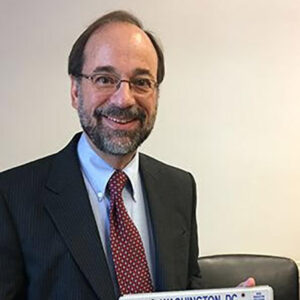calsfoundation@cals.org
Stephen L. Samuels (1952–2023)
Stephen L. Samuels, a Paragould (Greene County) native, was a lawyer at the United States Department of Justice for thirty-one years, developing a national reputation for expertise in environmental law, particularly the Clean Water Act of 1972. He served as the assistant chief of the Environmental Defense Section and oversaw some of the department’s most complex and contentious cases. In the wake of U.S. Supreme Court rulings that resulted in widespread confusion, he helped develop the Justice Department’s legal strategy for defending the Clean Water Act in nearly eighty lawsuits nationwide in state and federal courts. His work earned him the nickname “Mr. Clean Water Act.”
Steven Lee Samuels was born in Paragould on February 2, 1952. He was the third of three sons born to Bernard and Barbara Samuels. His grandfather, father, and uncles ran Samuels Hide and Metal Company in Paragould. His mother was active in local civic affairs and with the small Jewish community in northeastern Arkansas. Samuels was educated in Paragould public schools until his sophomore year in high school, when he left for Phillips Andover Academy in Massachusetts. After graduating from Andover in 1970, he attended Tulane University.
He became politically active at Tulane, leading the campus campaign for Democratic senator George McGovern’s 1972 presidential bid. He was selected as an alternate delegate from Arkansas to the 1972 Democratic National Convention, where he chafed against repeated instructions to back the nomination of Arkansas’s favorite son candidate, Congressman Wilbur Mills. Samuels’s convention presence made an impression on an ambitious Arkansas politician named Bill Clinton, who was then leading the McGovern campaign effort in Texas.
Samuels’s brush with national politics led him to briefly consider the idea of running for Congress, an idea he gave up during his early weeks at Stanford Law School. Samuels recalled his first class with Professor Tony Amsterdam, an iconic civil rights lawyer, who Samuels said taught him that “very little in life is black and white.” The law school experience curbed his electoral dreams. In a 2022 posted message to alumni of his Stanford law class, he wrote that in law school he learned “that my desire to become a politician was unrealistically based upon my very idealized view of our country and the people who take part in the electoral process.”
After graduating from law school in 1977, he began working at the Federal Energy Administration, predecessor to the Department of Energy, handling cases in the Office of Hearings and Appeals. In 1981, he joined the law firm of Breed Abbot & Morgan. He stayed for five years, but toward the end told friends that he longed to return to public service. In 1983, he married Joanna Pratt; they had two children, Evan and Vanessa.
On December 8, 1985, Samuels joined the Justice Department’s Environmental Defense division. He always remembered that date, he said, because it was four days after the Supreme Court decided United States v. Riverside Bayview Homes—a landmark victory for environmental advocates that marked the last time the high court voted unanimously on a wetlands issue. In the years that followed, the Clean Water Act was challenged in court repeatedly.
In 1993, Samuels was named one of two Justice Department representatives on President Clinton’s White House interagency taskforce on wetlands. Most wetlands in the United States are on private property, and government attempts to regulate dredging and other activities on private wetlands were increasingly challenged by private companies, landowners, and conservative legal foundations. In 2001, the Supreme Court issued the first in a series of complex decisions restricting the scope of the Clean Water Act. In Solid Waste Agency of Northern Cook County v. U.S. Army Corps of Engineers, the high court struck down a rule that allowed federal jurisdiction over ponds, marshes, and bogs if they provided habitat for migrating waterfowl. As environmental groups, regulators, and private property owners tried to understand the impact of this and similar decisions, Samuels was invited to interpret them, traveling across the country to speak about the new status of the law.
In 2006, a splintered U.S. Supreme Court issued a particularly confusing ruling in Rapanos v. United States, a 4–1–4 decision with justices suggesting three different tests for defining the reach of the Clean Water Act. Samuels was named chair of the Justice Department’s “Rapanos coordinating committee,” reviewing dozens of briefs addressing the impact of the case. The need to interpret the flurry of court rulings during this period “made Samuels the face of government Clean Water Act policy,” environmental newsletter Greenwire wrote in 2015. Subsequent court decisions further confused public understanding and inspired even more legal challenges. The publication noted that, as of 2015, the department had won ninety percent or more of the cases litigated after the Cook County decision.
His work navigating the court decisions was instrumental in defending the new Clean Water regulations of the administration of President Barack Obama. “Nobody within the Department of Justice and probably few in town, including at EPA, know the Clean Water Act better than Steve Samuels,” Thomas Lorenzen, a former Justice Department attorney, told Greenwire in 2015. The story noted that Samuels delayed his planned retirement that year to defend the Obama administration’s rule protecting wetlands against a range of legal challenges.
Samuels’s commitment to the Clean Water Act was displayed on his vanity license plate, which read: CWA 404, a reference to the wetlands provision of the Clean Water Act.
Samuels retired from the Justice Department in early 2017, just after the election of Donald Trump. In retirement, he became active in politics, advocating for statehood for the District of Columbia and other causes. Samuels and his wife received press attention when Vice President–elect Mike Pence moved temporarily into their neighborhood and the couple hoisted a gay pride flag in front of their home. Their message to the incoming vice president set off a chain reaction, with gay pride flags flying in Washington DC and around the country.
Samuels died on January 15, 2023, in Washington DC; he was cremated.
During the Trump presidency, administrative and court decisions undermined the wetlands regulations that had been championed by Samuels. Shortly after Samuels’s death, the Supreme Court issued a decision that sharply limited the enforcement of wetlands regulations. The decision in Sackett v. EPA limited federal regulations of wetlands to those instances in which a wetland flows into waters that are “channels of interstate commerce.” The sweeping decision was a topic of discussion during Samuels’s memorial service outside of Washington. His wife addressed the issue publicly, telling the audience—including scores of Justice Department employees—that the decision “will not stand the test of time. Steve and his DOJ and EPA colleagues will be back.”
For additional information:
Jacobs, Jeremy P., and Annie Snider. “Mr. Clean Water Act Faces His Biggest Challenge.” Greenwire, published by Energy and Environment News, September 30, 2015. https://www.eenews.net/articles/mr-clean-water-act-faces-his-biggest-challenge/ (accessed February 22, 2024).
“Paragould Native, Well-Known Lawyer, Dies in Washington, D.C.” Paragould Daily Press, April 29,2023. https://www.paragoulddailypress.com/news/paragould-native-well-known-lawyer-dies-in-washington-d-c/article_c55895ec-3a05-5255-afbd-0161b5afacad.html (accessed February 22, 2024).
Remarks of Former Assistant Attorney General John Cruden and Others at Stephen Samuels Memorial Service, Bethesda, Maryland, June 6, 2023. https://dmvmemorials.com/obituary/stephensamuels/ (accessed February 22, 2024).
Shapira, Ian. “In Mr. Pence’s New Neighborhood, Not Exactly the Welcome Wagon.” Washington Post, December 16, 2015. https://www.washingtonpost.com/local/dc-politics/in-mr-pences-new-dc-neighborhood-not-exactly-the-welcome-wagon/2016/12/03/5a7ca0f4-b974-11e6-a677-b608fbb3aaf6_story.html (accessed February 22, 2024).
Tom K. Hamburger
Washington DC
 Divergent Prosperity and the Arc of Reform, 1968–2022
Divergent Prosperity and the Arc of Reform, 1968–2022 Environment
Environment Law
Law Stephen Samuels
Stephen Samuels 




Comments
No comments on this entry yet.